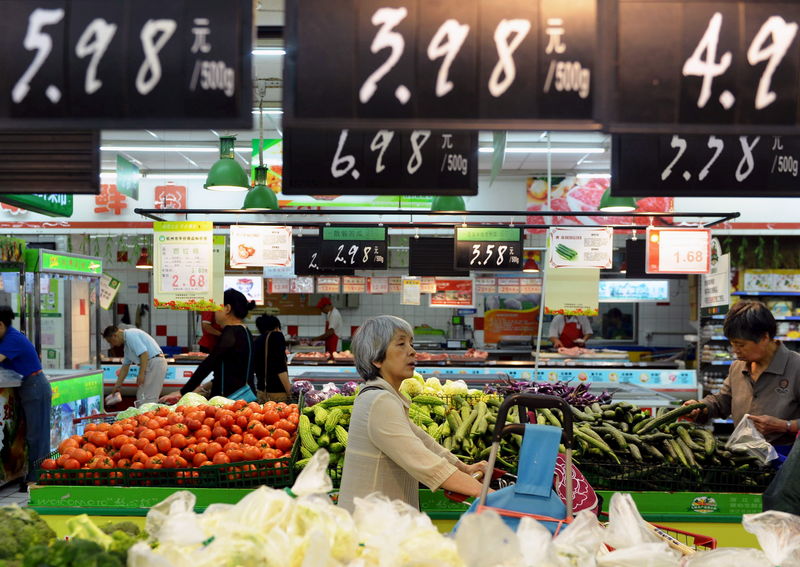By Pete Sweeney
SHANGHAI (Reuters) - China's consumer inflation eased while producer prices stayed stubbornly in deflation in May, bolstering the case for fiscal stimulus as the world's second-largest economy shrugs off monetary easing.
Annual consumer inflation eased to 1.2 percent in May thanks to a sharp drop in food costs, particularly pork, National Bureau of Statistics data showed on Tuesday, lower than a forecast 1.3 percent and the previous month's 1.5 percent.
The producer price index (PPI) stayed unchanged at a negative 4.6 percent, meaning that Chinese factory pricing power is sliding deeper into its fourth year of contraction.
"We are basically in the midst of a balance sheet recession with Chinese characteristics," said Andrew Polk, economist at the Conference Board in Beijing. "Companies and banks are busy repairing their balance sheets, and that suppresses borrowing appetite."
Polk said that the solution requires both a "dramatic" reduction to interest rates combined with more government spending.
Economists say weak producer prices are of particular concern as commodity prices - a major deflationary force at China's industrial heavyweights - are recovering yet producer prices remain depressed.
"We think the reflationary pressure in China is still remote and the CPI is likely to stay low," wrote Xie Dongming, economist at OCBC Bank, saying this offered ample room for further adjustments to interest rates and bank reserve requirements.
China cut interest rates for the third time in six months in May - on top of two reductions in the amount of money banks must keep in reserve, with little impact on deflation. Some economists believe China may be headed into a "liquidity trap" in which additional cash supply fails to translate into productive investment.
BOOM TIMES OVER
In an environment where returns on investment are usually lower than the nominal 5.1 percent lending rate for one year - and actual long-term lending rates generally far higher - company executives say there is little incentive to invest.
Indeed, some say the only measurable impact the easings have had is in the stock market, which has more than doubled since China began cutting interest rates in November.
Beijing has stepped up support for local governments as the economy confronts its worst year in a quarter century. It is engaged in a 1 trillion yuan debt swap intended to shore up finances at heavily indebted local governments, by exchanging their high-yield debt for low yielding municipal bonds.
The central government also has plenty of firepower left, including 1.7 trillion yuan of fiscal deposits. But deploying those funds, in particular given China's clunky budgetary process, will take time.
A Reuters poll suggested May indicators will do little to change the broad picture of an economy struggling under the weight of a property downturn, widespread factory overcapacity and local government debt.
"The heavy industrial sectors that have led the economy since the early 2000s are mired in excess capacity, and producer price deflation is entrenched," Arthur Kroeber of Gavecal Dragononics said in a research note.

"Clearly the boom times are over, and much more pain lies ahead."